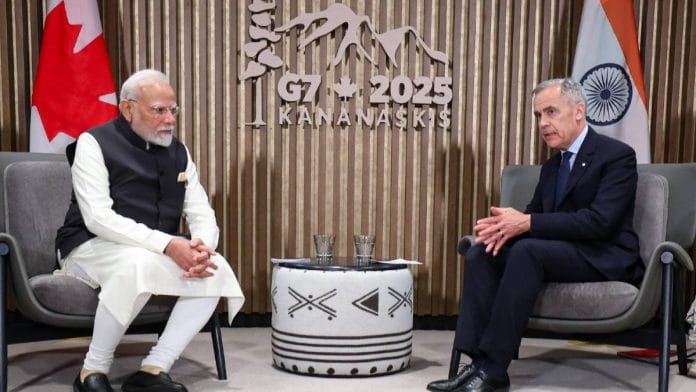New Delhi: After months of strained relations, Canada and India have agreed to restore diplomatic ties, beginning with the return of high commissioners to each other’s capitals under the new government of Mark Carney.
The move, announced on the sidelines of the G7 summit in Alberta where Prime Minister Narendra Modi met Canadian PM Carney, marks a significant thaw in bilateral relations following a bitter diplomatic standoff sparked by the earlier Justin Trudeau-led government.
It was the two leaders’ first in-person meeting since Carney assumed office in March.
Carney, who led the Liberal Party to victory in Canada’s general election this year, took the summit as an opportunity to invite Modi for bilateral discussions alongside G7 proceedings.
Both leaders agreed to name new high commissioners and to resume consular and diplomatic services that had been suspended last year.
“The leaders reaffirmed the importance of India-Canada ties, based on shared democratic values, respect for the rule of law and commitment to upholding the principles of sovereignty and territorial integrity. They underlined the need to pursue a constructive and balanced partnership grounded in mutual respect for concerns and sensitivities, strong people-to-people ties, and growing economic complementarities,” the Ministry of External Affairs said in a statement Wednesday.
“In this regard, both sides agreed to take calibrated and constructive steps to restore stability in the relationship, beginning with the early return of High Commissioners to each other’s capitals.”
The Canadian PM’s office said the decision was made “with the aim to restore normal services for citizens and businesses in both countries”.
At the meeting, Modi said the “relationship between India and Canada is very important in many ways”, describing the G7 gathering as an “opportunity to serve the world”. He also congratulated Carney on his election and emphasised shared democratic values.
Carney, in turn, called it a “great honour” to welcome Modi to the G7. “It’s a testament to the importance of your country, to your leadership, and to the importance of the issues that we look to tackle together,” he said, citing cooperation on artificial intelligence, energy security, and the global fight against “transnational repression and terrorism”.
The India-Canada row, sparked by the 2023 killing of Sikh separatist Hardeep Singh Nijjar in British Columbia and Canada’s subsequent allegation of Indian involvement, had led to a tit-for-tat expulsion of diplomats and a freeze in high-level ties that lasted nearly a year.
The diplomatic rupture began when Trudeau publicly accused the Indian government of involvement in the killing.
India last October announced the withdrawal of High Commissioner to Canada Sanjay Kumar Verma, along with several other “targeted diplomats and officials”, following an unprecedented move by the Canadian government under Trudeau identifying them as “persons of interest” in the 2023 killing of Nijjar.
The same day, India also expelled six Canadian diplomats, including the acting high commissioner and deputy commissioner, ordering them to leave the country.
Carney, while less confrontational than his predecessor, did allude to the controversy. In his public remarks, he cited Canada’s ongoing commitment to fighting “transnational repression”, a veiled nod to the unresolved allegations relating to Nijjar’s case.
Yet, both governments signalled readiness to move forward. Carney and Modi agreed to restart negotiations on an “early progress trade agreement”, a stepping stone toward a comprehensive economic partnership pact.
They also identified clean energy, artificial intelligence, LNG, food security, and higher education as areas of future collaboration.
In a joint statement, both leaders reaffirmed their commitment to a “free and open Indo-Pacific” and pledged to work together on shared global priorities, including climate action and inclusive growth.
(Edited by Nida Fatima Siddiqui)
Also Read: Why has India reacted differently to Canada & US? Trudeau did politics, America hard diplomacy






